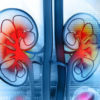Migraine Headache Treatment Near You in New Jersey
 Most people have experienced headaches at some point in their lives. However, migraines are much more than average headaches. The severe pain, light sensitivity, and other symptoms can be debilitating, detaching a person from everyday life for hours or days at a time. For patients who suffer from frequent migraines, Bergen Medical Associates can help. Its multi-specialty team of board-certified practitioners provides migraine treatment to help New Jersey patients return to normal living.
Most people have experienced headaches at some point in their lives. However, migraines are much more than average headaches. The severe pain, light sensitivity, and other symptoms can be debilitating, detaching a person from everyday life for hours or days at a time. For patients who suffer from frequent migraines, Bergen Medical Associates can help. Its multi-specialty team of board-certified practitioners provides migraine treatment to help New Jersey patients return to normal living.
What Is a Migraine Headache?
A migraine headache is a severe, pulsing headache that most often appears on one side of the head. Some individuals experience migraines very rarely. Others might have an attack several times each month. Each headache lasts for hours or days, and the pain is often debilitating. Migraines can interfere with daily routines, social gatherings, and other activities, making it difficult to maintain a high quality of life until the attack subsides.
What Are Migraine Headache Symptoms?
Migraine headaches have four distinct stages: prodrome, aura, attack, and postdrome. Some individuals may experience all four stages in a migraine, while others may skip a stage. Each stage has its own duration and a unique set of symptoms:
Prodrome
The prodrome begins one or two days before a migraine attack. Patients who experience a prodrome may notice subtle changes, including:
- Constipation
- Frequent urination
- Mood swings
- Difficulty concentrating
- Food cravings
- Stiff neck
- Frequent yawning
- Trouble sleeping
Aura
A migraine aura is a warning symptom that begins shortly before the migraine attack. For some patients, it may begin concurrently with the onset of the attack. Symptoms begin gradually and build up over several minutes up to one hour. They may include:
- Visual changes, like bright spots, flashes of light, or shapes
- Loss of vision
- Ringing in ears (tinnitus)
- Pins and needles in one arm or leg
- Weakness or numbness in the face or one side of the body
- Strong sensitivity to touch
- Difficulty speaking
Attack
The attack stage refers to the migraine headache itself. The headache lasts between four and 72 hours if not treated, often with debilitating symptoms. They include:
- Severe pain, often on one side of the head
- Pain that throbs or pulses
- Sensitivity to light, sound, and sometimes smell or touch
- Nausea and vomiting
Postdrome
The postdrome can be thought of as the recovery phase. After a migraine attack ends, a person might feel confused, drained, or fatigued, and sudden head movements may provoke more pain. Other individuals may feel elated or energized.
What Causes Migraine Headaches?
Migraines are a common complaint, affecting up to 12% of the population in the United States. Their cause is not fully understood. They are believed to be neurological in origin, perhaps related to changes in major neural pathways or imbalances in brain chemicals.
Though physicians do not always know what causes migraines, they have connected attacks with a variety of potential triggers. These include:
- Hormone imbalances
- Too much alcohol or caffeine
- Stress
- Sensory stimuli, including bright flashing lights, loud sounds, or strong smells
- Changes in sleep habits
- Intense physical exertion
- Weather changes
- Certain medications
- Aged cheeses and processed foods
- Food additives, including aspartame and MSG
- Asthma attacks
- Skipping meals
Migraines also tend to run in families. If a person has a relative who experiences frequent migraines, they may also be susceptible.
How Are Migraine Headaches Diagnosed?
Diagnosing a migraine headache begins with reviewing the patient’s medical history, including their family health history. The physician will then perform a physical and neurological exam. The physician will ask the patient to perform movements that test their senses and neurological function. They may also interview the patient about their symptoms, with questions such as:
- What does the headache feel like, and where is it located?
- What other symptoms do you experience?
- How severe are the migraine symptoms?
- How long do symptoms last?
- Does anything make the headache better or worse?
The physician may also order blood tests or medical imaging, such as a computed tomography (CT) scan, magnetic resonance imaging (MRI) scan, or electroencephalogram (EEG). These are used to rule out other potential causes for headaches.
What Treatments Are Available for Migraine Headaches?
There is no cure for migraine headaches. If a person experiences frequent headaches, they are likely to continue experiencing them for the rest of their life. Physicians may, however, recommend treatments to reduce headache frequency and symptoms. Treatment strategies include:
- Medication: Certain medications have been shown to stop migraines if taken at the first sign of a headache. Others may prevent migraines or reduce their frequency.
- Lifestyle changes: If the patient is aware of their migraine triggers, then lifestyle adjustments to avoid triggers may help them avoid headaches in some cases.
There are also steps that patients can take to relieve the symptoms of a migraine attack while it occurs.
- Resting in a cool, dark, and quiet room
- Applying a hot or cold compress to the head or back of the neck
- Massaging the scalp
- Massaging the temples with gentle pressure in a circular motion
- Practicing relaxation and mindfulness techniques
Find Migraine Headache Relief Near You in New Jersey
Though migraine headaches are debilitating, patients do not need to struggle alone. Bergen Medical Associates offers migraine treatments at locations near you throughout northern New Jersey (Emerson, Montvale, Northvale, Paramus, and Ridgewood, NJ), helping patients manage severe headaches to maintain a high quality of life. To learn more about migraines or to schedule an initial consultation, request an appointment today.












